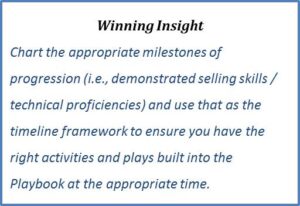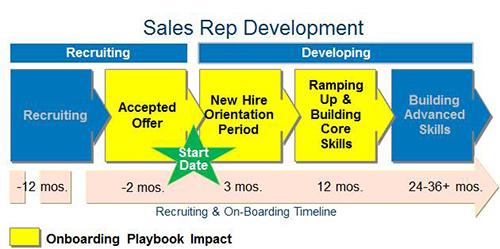Onboarding Playbooks – New Hires in the Express Lane

“Welcome to the company! We’re delighted to have you join us as our newest sales rep … here’s your employee manual, keys to your company car and a directory of your territory. Good Luck!”
This type of greeting is too often onboarding reality rather than hyperbole. Evidence shows that a delay in making new hires fully functional leads to a productivity loss that can exponentially impact a company’s top-line. When that revenue risk is compounded with the substantial investments to find and recruit top talent, there is a compelling reason to ensure onboarding success. However, many organizations treat their onboarding process like a pre-flight security announcement: rote, compliance-oriented and not particularly useful.
At the Alexander Group, we have found that top-performing sales teams recognize the economic value of reducing the time between a start date and the point at which an employee becomes fully functional for the organization – in essence, putting their new hires in the express lane. One of the most useful tools to get a new hire up to speed is an Onboarding Playbook.
Onboarding Playbooks serve two key functions:
- They act as a repository and a manual for all the necessary onboarding administration; and
- More importantly, they provide a straight-forward “how-to guide” for all the key plays a new seller must be able to execute.
Successful Onboarding Playbooks combine these two elements into an episodic roadmap that begins well in advance of a new hire’s start date and continues through his or her journey toward a fully functional sales representative, usually nine months to a year. The playbook reads like an extremely well-organized day-planner with carve-outs for when to do what and by whom. The elements of sales strategy are overlaid to match the maturity and development of the rep.
 Playbook Design
Playbook Design
Best practice Onboarding Playbook design combines both the tactical and strategic.
- Tactical elements (i.e., employment forms, IT training and equipment distribution) are included in the Onboarding Playbook so that both new hires and their managers have an accountability tracking method to ensure the dozens of administrative elements are sequenced into the right timeline.
- Strategic plays that outline when to do what, whom to sell to, what to say and how to best represent value as a sales rep eliminate uncertainty and accelerate confidence. This content often already exists in sale training curricula. Great playbooks translate this training into easily consumable plays that the front-line sales manager can coach in real time and the newly hired sales rep can refer to when deployed on his or her own.
Given the dual purpose of the Onboarding Playbook, it is important to have a diversified design team that includes sales leaders, HR representatives and training specialists. Ultimate ownership of playbook content often resides within the sales operations team. Sales ops can best moderate the various constituents’ requirements while ensuring new hires receive a consistent, functional tool.
The Role of Sales Managers in Playbook Deployment
Onboarding Playbooks are written for the new hire reps. The biggest beneficiary of the playbook, however, might be the new hire’s manager. Onboarding Playbooks provide an invaluable tool to help coaches get their team up to speed.
Many organizations include a tightly scripted manager-rep coaching cadence into their playbooks. This not only sets an expectation of when and how often new hires will be interacting with their managers, but it also provides guidance as to what will be covered.
Well-constructed playbooks use a timeline format that begins with the offer letter and continues through the first year of employment. This acts as a checklist to ensure administrative compliance and as a means to evaluate new hire performance, allowing for swift corrective action when necessary.
The power of the Onboarding Playbook lies in its ability to simplify the tactical so that managers and reps can focus on the act of selling. And with the right plays in place, sales success will come faster.
Learn more about how you can put your new hires in the express lane through Onboarding Playbooks.